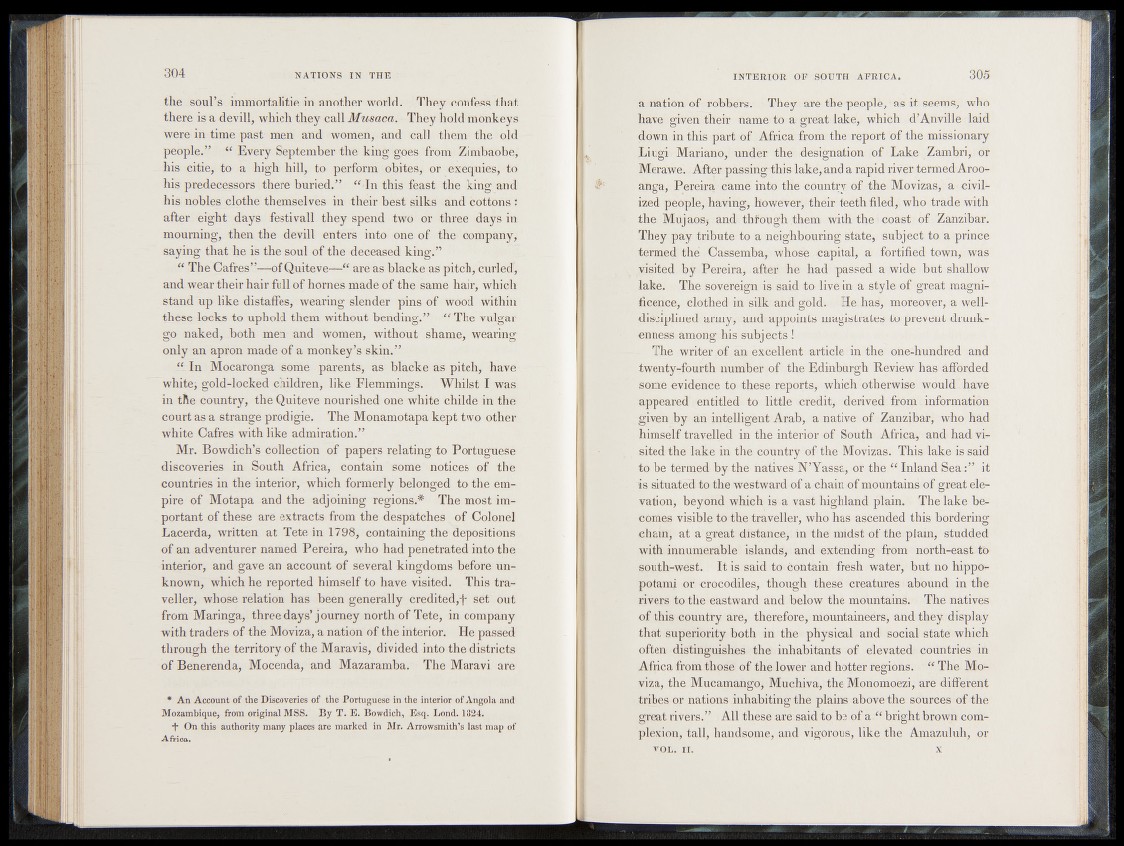
the soul’s immortalitie in another world, They confess that
there is a devill, which they" call Musaca. They hold monkeys
were in time past men and women, and call them' the • old
people.” “ Every September the king goes from Zimbaobe,
his citie, to a high hill, to perform obites, or exequies, to
his predecessors there buried.” “ Jn this feast the king and
his nobles clothe themselves in their best silks and cottons *
after .'eight days festivall they spend two or three da^S in
mourning, then the devill enters into one of the company,
saying that he is the soul of the deceased king.”
“ TheCafres”—^-of Quiteve-^-“ are as blacke as pitch, curled,
and,wear their hair full of homes made of the same hair, which
stand up like distaffes, wearing slender pins of wood within
these locks to uphold them without bending.” “ The vulgar
go naked, both men and women, without shame, wearing
only an apron made of a monkey’s skin,”
“ In Mocaronga some parents, as blacke as pitch, have
white; gold-locked children, like Flemmings. Whilst I was
in the country, theQuiteve nourished one white childe in the
court as a strange prodigie. The Monamotapa kept two other
white Cafres with like admiration.”
Mr. Bowdich’s collection of papers relating to Portuguese
discoveries in South Africa, contain some notices of the
countries in the interior, which formerly belonged to the empire
of Motapa and the adjoining regions.* The most im~
portant of these are extracts from the despatches of Colonel
Eacerda, written at Tete in 1798, containing the depositions
of an adventurer named Pereira, who had penetrated into the
interior, and gave an account of several kingdoms before unknown,
which he reported himself to have visited. This traveller,
whose relation has been generally credited,-f* set out
from Maringa, three days’journey north of Tete, in company
with traders of the Moviza, a nation of the interior. He passed
through the territory of the Maravis, divided into the districts
of Benerenda, Mocenda, and Mazaramba. The Maravi are
* An Account of the Discoveries of the Portuguese in the interior of Angola and
Mozambique, from original MSS." By T. E. Bowdich, Esq. Lond. 1824.
-f- On this authority many places are marked in Mr. Arrowsmith’s last map of
Africa.
a nation of robbers.They are the peoplh,vas it seems, who
hayet given their name to a great; lake, which d’Anville laid
down in this part of Africa from the 'report t*of the missionary
jLidgji. Mariano, under, the designation lof&Lake Zambri;I or
Merawe., After passing’this lake, and a rapid river termed Aroo-
anga, Pereira - came into tlie country of the Movizas, a * civilized
people, having, however, their teeth filedy who trade with
the Mdj aosj and thfou gh them with the f coast * of s Zanzibar.
They pay tribute to a -neighbouring state,- subject to a prince
termed the* Cassemba, whos£ capital, a fortified town, was
visited by Pereira, after he had passed' a wide but shallow
lake. The sovereign-ris said to liv.efin.-a stylo?©f^redt magnificence,
clothed in silk and gold. HeJiasy moreover, a well-
disciplined; army, and appoints magistrates to prevent drunkenness
among his subj ects 1 -
The writer .of, an .excellent article in the onediundred and
twentyrfourth number of the Edinburgh Review has afforded
some evidence to these reports, whieh otherwise would. have
appeared entitled to little credited derived", from. information
given by an intelligent Arab, a native; of - Zanzibar, who had
himself travelled in the interidli'Of South . Africa*, and had visited
the lake in the country of-the Movizas. This lake is said
to be termed by the natives N’Yassa, or the “ Inland^.eai” it
is situated to. the westward of a chain of mountains of great elevation,
beyond which is a vast highland plain. • The lake becomes
visible to the traveller, who has ascended this bordering
chain, at a great distance, in the midst of the plain/studded
with innumerable islands, and extending- from north-east to
south-west. It is ;said to contain fresh water,' but no hippopotami
or crocodiles, though these creatures 1 abound in the
rivers to the eastward and below the mountains. The natives
of this country are, therefore, mountaineers, and they display
that superiority both in the physical and social #t&t@'^hich
often distinguishes the inhabitants of elevated countries in
Africa from those of the lower and hotter regions. “ The- Moviza,
the Mucamango, :Muehiva,;the Monomoezi, are different
tribes or nations inhabiting the plains above thes. sources of the
great rivers.” All these are said to’be of a “ bright brown complexion,
tall, handsome, and vigorous, like the Amazuluh, or
VOL. II. x